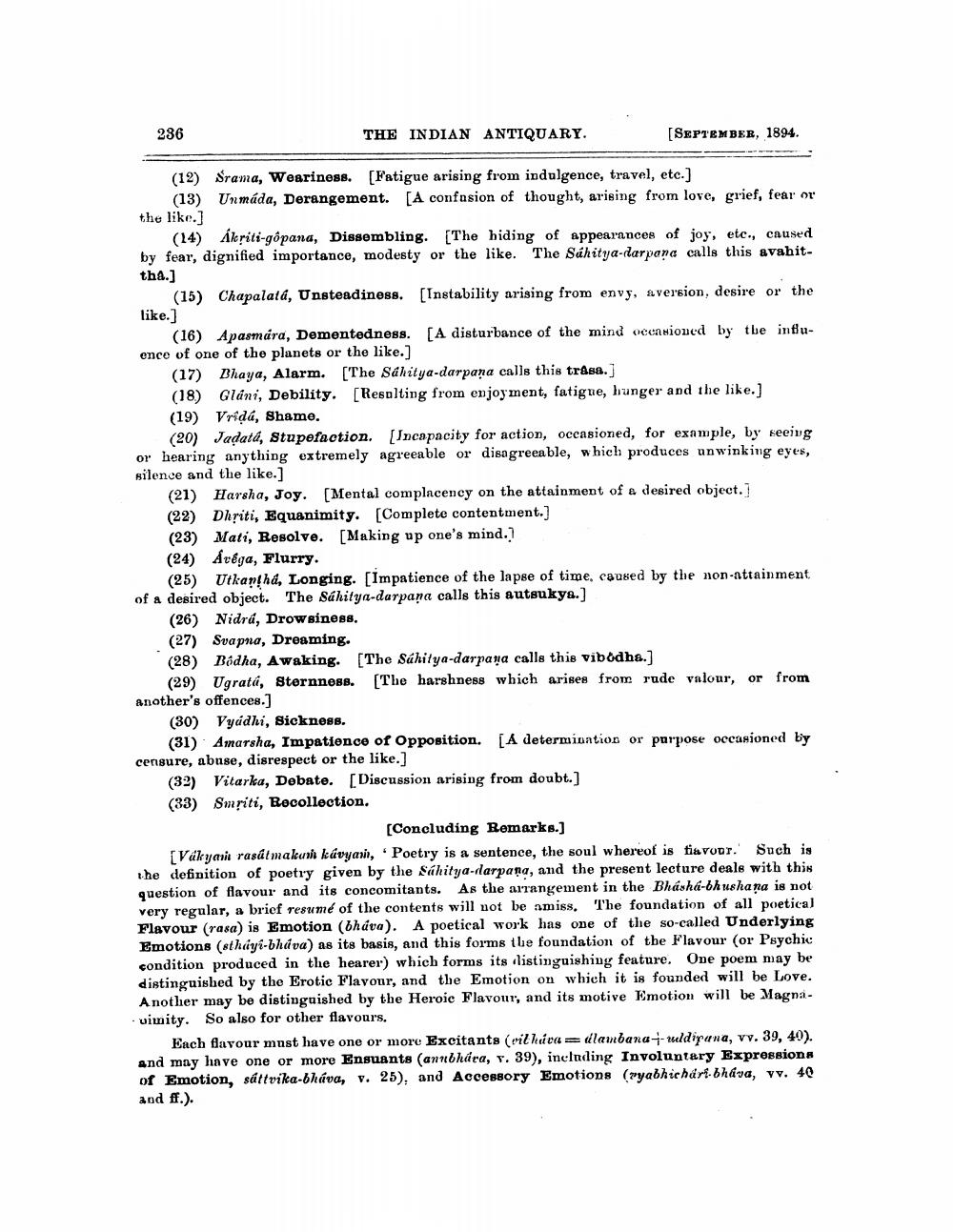________________
236
THE INDIAN ANTIQUARY.
(SEPTEMBER, 1894.
(12) Srama, Weariness. (Fatigue arising from indulgence, travel, etc.)
(13) Unmáda, Derangement. [A confusion of thought, arising from love, grief, fear or the like.]
(14) Alcriti-gopana, Dissembling. The hiding of appearances of joy, etc., caused by fear, dignified importance, modesty or the like. The Sahitya-darpanc calls this avahittha.]
(15) Chapalatá, Unsteadiness. [Instability arising from envy, aversion, desire or the like.]
(16) Apasmára, Dementedness. [A disturbance of the mind occasioned by the intuonce of one of the planets or the like.]
(17) Bhaya, Alarm. [The Sahitya-darpana calls this trasa.] (18) Glani, Debility. [Resolting from enjoyment, fatigue, hunger and the like.] (19) Vrida, Shame.
(20) Jadata, Stupefaction. Incapacity for action, occasioned, for example, by seeing or hearing anything extremely agreeable or disagreeable, which produces unwinking eyes, silence and the like.]
(21) Harsha, Joy. [Mental complacency on the attainment of a desired object. (22) Dhriti, Equanimity. (Complete contentment.] (23) Mati, Resolve. [Making up one's mind.? (24) Årēga, Flurry.
(25) Utkanthá, Longing. (Impatience of the lapse of time, caused by the non-attainment of a desired object. The Sáhitya-darpaşa calls this a utsukya.)
(26) Nidra, Drowsiness. (27) Svapna, Dreaming. (28) Bódha, Awaking. [The Sáhitya-darpana calls this vibodha.]
(29) Ugratá, Sternness. [The harshness which arises from rude valour, or from another's offences.]
(30) Vyádhi, Sickness.
(31) Amarsha, Impatience of Opposition. [A determination or purpose occasioned by censure, abuse, disrespect or the like.]
(32) Vitarka, Debate. [Discussion arising from doubt.] (33) Smriti, Recollection,
(Concluding Remarks.] (Vák yani rasátmakunk kávyam, Poetry is a sentence, the soul whereof is flavour. Such is the definition of poetry given by the Sahitya-darpana, and the present lecture deals with this question of flavour and its concomitants. As the arrangement in the Bhasha-bhushana is not very regular, a brief resume of the contents will not be nmiss. The foundation of all poetical Flavour (rasa) is Emotion (bhava). A poetical work has one of the so-called Underlying Emotions (sthayi-bháva) as its basis, and this forms the foundation of the Flavour (or Psychic condition produced in the hearer) which forms its listinguishing feature. One poem may be distinguished by the Erotic Flavour, and the Emotion on which it is founded will be Love. Another may be distingaished by the Heroic Flavour, and its motive Emotion will be Magnauimity. So also for other flavours.
Each flavour must have one or more Excitants (vilkeca=dlambana uldipana, vy. 39, 40). and may have one or more Ensuants (annbhára, T. 39), including Involuntary Expressions of Emotion, sáttvika-bháva, v. 25), and Accessory Emotions (ryabhichári-bhava, vv. 40 and ff.).




